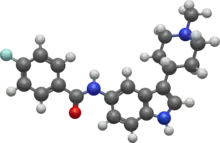LY-334370
LY-334370 is a selective 5-HT1F receptor agonist[1] which was under development by Eli Lilly and Company for the treatment of migraine headaches.[2] The drug showed efficacy in a phase II clinical trial[3] but further development was halted due to toxicity detected in animals.[4]
 | |
 | |
| Names | |
|---|---|
| Preferred IUPAC name
4-Fluoro-N-[3-(1-methylpiperidin-4-yl)-1H-indol-5-yl]benzamide | |
| Other names
LY-334,370 | |
| Identifiers | |
3D model (JSmol) |
|
| ChemSpider | |
| MeSH | C108218 |
PubChem CID |
|
| UNII | |
CompTox Dashboard (EPA) |
|
| |
| |
| Properties | |
| C21H22FN3O | |
| Molar mass | 351.425 g·mol−1 |
Except where otherwise noted, data are given for materials in their standard state (at 25 °C [77 °F], 100 kPa).
Infobox references | |
See also
References
- Dupuis DS, Colpaert FC, Pauwels PJ (1998). "G-protein activation at 5-HT1A receptors by the 5-HT1F ligand LY-334,370 in guinea-pig brain sections and recombinant cell lines". Br. J. Pharmacol. 124 (2): 283–90. doi:10.1038/sj.bjp.0701832. PMC 1565387. PMID 9641544.
- Shepheard S, Edvinsson L, Cumberbatch M, Williamson D, Mason G, Webb J, Boyce S, Hill R, Hargreaves R (1999). "Possible antimigraine mechanisms of action of the 5HT1F receptor agonist LY-334,370". Cephalalgia. 19 (10): 851–8. doi:10.1046/j.1468-2982.1999.1910851.x. PMID 10668103. S2CID 8439008.
- Goldstein DJ, Roon KI, Offen WW, Ramadan NM, Phebus LA, Johnson KW, Schaus JM, Ferrari MD (2001). "Selective seratonin 1F (5-HT1F) receptor agonist LY334370 for acute migraine: a randomised controlled trial". Lancet. 358 (9289): 1230–4. doi:10.1016/S0140-6736(01)06347-4. PMID 11675061. S2CID 39926402.
- Ramadan NM, Buchanan TM (2006). "New and future migraine therapy". Pharmacol. Ther. 112 (1): 199–212. doi:10.1016/j.pharmthera.2005.04.010. PMID 16797716.
External links
- 4-fluoro-N-(3-(1-methyl-4-piperidinyl)-1H-indol-5-yl)benzamide at the U.S. National Library of Medicine Medical Subject Headings (MeSH)
This article is issued from Wikipedia. The text is licensed under Creative Commons - Attribution - Sharealike. Additional terms may apply for the media files.